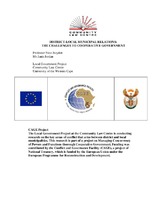| dc.contributor.author | Steytler, Nico | |
| dc.contributor.author | Jordan, Janis | |
| dc.date.accessioned | 2019-07-23T10:26:36Z | |
| dc.date.available | 2019-07-23T10:26:36Z | |
| dc.date.issued | 2005 | |
| dc.identifier.citation | Steytler, N, Jordan, J., 2005. District-local municipal relations: The challenges to cooperative government, Cape Town: Community Law Centre, University of the Western Cape. | en_US |
| dc.identifier.uri | http://hdl.handle.net/10566/4740 | |
| dc.description.abstract | Outside of metropolitan areas, local government is shared by district and local municipalities; the 47 district municipalities and 231 local municipalities share legislative and administrative powers over the same geographical area. This overlapping jurisdiction was bound to raise questions regarding its functionality.
The system of local government is premised on cooperation and a productive atmosphere between district and local municipalities. It has been noted by the National Assembly Portfolio Committee on Local Government that the relationship between district and local municipalities varies from “cordial and cooperative to conflictual and unproductive”.1 The Western Cape branch of the South African Association for Local Government (SALGA) noted in their minutes2 that there is “an unwillingness to interact in a cooperative way” among district and local councils. A member of the Free State Provincial Department of Local Government3 noted that relations between the district and local municipalities counted among the reasons for the bad state of local government in the province. These examples illustrate the urgent need to address the state of relationships between district and local institutions.
This question is what causes conflict and ultimate unproductiveness? Having identified key areas of conflict, the next question to be addressed is: how are these conflicts managed? This question is pertinent in light of the Intergovernmental Relations Framework Act4 (IRFA) which requires the establishment of District Intergovernmental Forums (DIFs) aimed at managing such relations. The object of this study is thus the identification of the challenges that DIFs must meet. This paper must be read with the “Status quo report on intergovernmental relations regarding local government”, prepared by the Local Government Project, which focuses on the incidence and functioning of intergovernmental forums at district level prior to the IRPA coming into operation | en_US |
| dc.language.iso | en | en_US |
| dc.publisher | Community Law Centre, University of the Western Cape | en_US |
| dc.subject | Local government | en_US |
| dc.subject | Metropolitan areas | en_US |
| dc.subject | Administrative powers | en_US |
| dc.subject | Eastern Cape | en_US |
| dc.subject | Constitution | en_US |
| dc.title | District-local municipal relations: The challenges to cooperative government | en_US |
| dc.type | Working Paper | en_US |

